List of national memorials of the United States
 From Wikipedia - Reading time: 27 min
From Wikipedia - Reading time: 27 min

National memorial is a designation in the United States for an officially recognized area that memorializes a historic person or event.[1] As of September 2020[update] the National Park Service (NPS), an agency of the Department of the Interior, owns and administers thirty-one memorials as official units and provides assistance for five more, known as affiliated areas, that are operated by other organizations.[2] Congress has also designated twenty-two additional independently operated sites as national memorials. Another five memorials have been authorized and are in the planning stage. Memorials need not be located on a site directly related to the subject,[3] and many, such as the Lincoln Memorial, do not have the word "national" in their titles. There is a degree of overlap in development of some areas designated as memorials, monuments, and historic sites, and their characterization is not always consistent with their names, such as whether the site is closely associated with whom it memorializes.[4]
The earliest and perhaps most recognizable is the uniquely designated Washington Monument, which was completed in 1884 and transferred to the NPS in 1933. The most recently established is the Dwight D. Eisenhower Memorial, dedicated in 2020. The Pearl Harbor National Memorial was created out of the World War II Valor in the Pacific National Monument in 2019 and was previously just the USS Arizona Memorial. The NPS national memorials are in 15 states and the District of Columbia. Washington, D.C., has the most, twelve, followed by Pennsylvania and New York, each with three. The affiliated areas are in four states (two additional beyond those with NPS memorials) and the Northern Mariana Islands, while the other sites are in nine states (five additional), the District of Columbia, and Midway Atoll. Creation of new memorials in Washington, D.C. is governed by the Commemorative Works Act, while outside the District there are no systematic regulations.[5]
Among the NPS national memorials and affiliated areas, ten celebrate US presidents, eleven recognize other historic figures, six commemorate wars, five memorialize disasters, and five represent early exploration. Eleven of the twenty-two non-NPS memorials commemorate wars or veterans, another ten represent groups of people who died for related reasons, and one relates to Native American history. Several major war memorials are located on or near the National Mall, contributing to the national identity.[6][7] The historic areas within the National Park System are automatically listed on the National Register of Historic Places.[8]
"National Memorial" is omitted below in the names of sites that include it; others may separate the two words or just use "Memorial", and there is also one international memorial included. Private and other organizations may use the name "national memorial" (such as George Washington Masonic National Memorial and National Memorial for Peace and Justice) but they are not officially designated by the federal government, and are not listed here, as they are not created pursuant to the statutory scheme.[9]
National Park Service national memorials
[edit]The National Park Service manages 31 national memorials as official units.[10] It also oversees two more national memorials as part of other units, listed with the other national memorials. A few additional units, including Fort McHenry National Monument, include "national memorial" in their enabling legislation,[11] but are not otherwise called that and are thus not listed here.
| Name | Image | Location | Date established[12] | Area[12][13] | Description |
|---|---|---|---|---|---|
| Arkansas Post | 
|
Arkansas 34°01′N 91°21′W / 34.02°N 91.35°W |
July 6, 1960 | 757.51 acres (3.0655 km2) | Henri de Tonti established the Arkansas Post in 1686 as the first European trading post in the Mississippi River Valley as part of French Louisiana. It grew into a small settlement and was the site of skirmishes with Native Americans before becoming part of New Spain in 1763 and the US in 1803 with the Louisiana Purchase. A Civil War battle was won by the Union there in 1863. Visitors can tour a reconstructed fort and archaeological remains of Native American, European, and American settlements.[14] |
| Arlington House, The Robert E. Lee Memorial | 
|
Virginia 38°52′52″N 77°04′23″W / 38.881°N 77.073°W |
June 25, 1955 | 28.08 acres (0.1136 km2) | This mansion was built by George Washington's adopted grandson George Washington Parke Custis, partially as a memorial to Washington. After Custis's death it was managed by his son-in-law Robert E. Lee, who became commander of the Confederate States Army. The US government seized it during the Civil War and established Arlington National Cemetery around it. The house and grounds have been restored with pre-war decor and artifacts of the Custis and Lee families.[15] |
| Chamizal | 
|
Texas 31°46′N 106°27′W / 31.77°N 106.45°W |
February 4, 1974 | 54.90 acres (0.2222 km2) | Northward shifts in the Rio Grande led to a dispute over the Mexico–United States border between El Paso, Texas, and Ciudad Juárez. Summits and tribunals beginning in 1909 failed to resolve the controversy until a 1964 settlement transferred land on both sides of a rechanneled river. The museum and park next to the Bridge of the Americas checkpoint commemorate the resolution and international diplomacy.[16] |
| Coronado | 
|
Arizona 31°20′N 110°15′W / 31.34°N 110.25°W |
November 5, 1952 | 4,830.22 acres (19.5472 km2) | Francisco Vázquez de Coronado led the first European exploration of the Southwest, from Arizona to Kansas, finding the Grand Canyon. The site on the Mexican border, where Coronado entered what is now the US, includes a cave and hiking trails through ridges and canyons.[17] |
| De Soto | 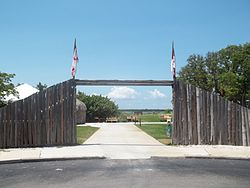
|
Florida 27°31′N 82°38′W / 27.52°N 82.64°W |
March 11, 1948 | 30 acres (0.12 km2) | Hernando de Soto led the first European exploration of the Southeast, searching for gold while trading and fighting with various Native American tribes before his death along the Mississippi River in 1542. The memorial at the 1539 landing site on Tampa Bay has a reconstructed camp, reenactment events, historic artifacts, and waterfront trails.[18] |
| Dwight D. Eisenhower Memorial | 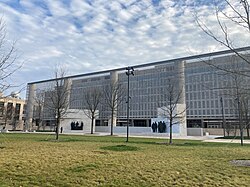
|
District of Columbia 38°53′N 77°01′W / 38.89°N 77.02°W |
September 17, 2020 | 3.39 acres (0.0137 km2) | Dwight D. Eisenhower was the Supreme Commander of the Allied Forces in Europe during World War II and President of the United States in the 1950s. His accomplishments included enforcing school integration, creating NASA and the Interstate Highway System, and ending the Korean War. The memorial features stacked blocks showing quotations; sculptures depicting Eisenhower as a boy, general, and president; and a steel tapestry with an abstract depiction of Pointe du Hoc, a site of D-Day.[19][20] |
| Federal Hall | 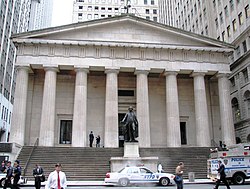
|
New York 40°42′25″N 74°00′36″W / 40.707°N 74.010°W |
August 11, 1955 | 0.45 acres (0.0018 km2) | This neoclassical building on Wall Street, originally the Port of New York Custom House, stands at the site of the first US Capitol building. The original Federal style building was the site of George Washington's inauguration, the 1st United States Congress, and previously the Congress of the Confederation.[21] |
| Flight 93 | 
|
Pennsylvania 40°03′18″N 78°54′04″W / 40.055°N 78.901°W |
September 10, 2011 | 2,319.96 acres (9.3885 km2) | The fourth airplane hijacked in the September 11, 2001, attacks, United Airlines Flight 93, crashed in a field in southwest Pennsylvania after the passengers fought back against the terrorists, preventing a further attack at the capital. The memorial on the site has a white granite wall engraved with the names of the 40 victims, a 93 ft (28 m)-tall Tower of Voices with 40 wind chimes, and a visitor center.[22] |
| Fort Caroline | 
|
Florida 30°23′10″N 81°29′53″W / 30.386°N 81.498°W |
January 16, 1953 | 138.39 acres (0.5600 km2) | Around 200 French Huguenots founded Fort Caroline (named after King Charles IX) as a refuge in French Florida in 1685. A year later the Spanish founded St. Augustine nearby and attacked and massacred the settlers at Fort Caroline to take unified control of the region. The current site within the Timucuan Preserve has a reconstructed fort with hiking trails, a visitor center, and monument to the executed leader Jean Ribault.[23] |
| Franklin Delano Roosevelt Memorial | 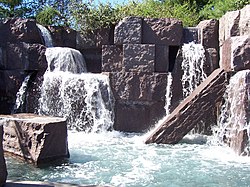
|
District of Columbia 38°52′59″N 77°02′35″W / 38.883°N 77.043°W |
May 2, 1997 | 8.14 acres (0.0329 km2) | Franklin D. Roosevelt was the United States' longest-serving president, leading the country during a period of enormous national challenges. Four sections of waterfalls and pools represent Roosevelt's terms in office, when he instituted the New Deal to modernize the economy during the Great Depression and unified the country during World War II. Bronze statues of Roosevelt, his wife Eleanor, his dog Fala, and scenes of period Americans stand between stone walls engraved with notable quotations.[24] |
| General Grant | 
|
New York 40°48′47″N 73°57′47″W / 40.813°N 73.963°W |
May 1, 1959 | 0.76 acres (0.0031 km2) | Ulysses S. Grant was general of the Union Army and led several victories in Civil War battles before forcing surrender of Lee's Confederacy. He served two terms as president of the United States, overseeing Reconstruction and civil rights, government reform, and relations with Native Americans. Grant's Tomb in Upper Manhattan is his and his wife's resting place, designed after the Mausoleum at Halicarnassus.[25] |
| Hamilton Grange | 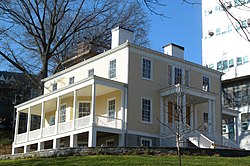
|
New York 40°49′16″N 73°56′49″W / 40.821°N 73.947°W |
November 19, 1988 | 1.04 acres (0.0042 km2) | Alexander Hamilton was a Founding Father who promoted adoption of the Constitution and served as the first Secretary of the Treasury to establish the nation's economic and political system. He lived in this mansion in Harlem for the last two years of his life before being killed in a duel, and his widow lived there for 29 more years. It has been relocated in the vicinity twice for preservation and restoration and now hosts tours.[26] |
| Johnstown Flood | 
|
Pennsylvania 40°21′00″N 78°46′16″W / 40.350°N 78.771°W |
August 31, 1964 | 177.76 acres (0.7194 km2) | When the South Fork Dam catastrophically failed in 1889, the town of Johnstown, Pennsylvania, was flooded and more than 2,200 people died, making the flood now the third-deadliest event in the US. The memorial at the site of the dam remains features a visitor center, short hiking trails, and a historic clubhouse.[27] |
| Korean War Veterans Memorial | 
|
District of Columbia 38°53′17″N 77°02′53″W / 38.888°N 77.048°W |
July 27, 1995 | 1.56 acres (0.0063 km2) | The US led United Nations forces in the Korean War from 1950 to 1953 defending South Korea against North Korea as part of the Cold War. Of the over 300,000 US servicemembers, more than 36,000 died in the war that ended in a stalemate. The memorial includes a black granite wall etched with images of soldiers, 19 statues of a platoon on patrol, and the Pool of Remembrance that reflects the surrounding linden trees.[28] |
| Lincoln Boyhood | 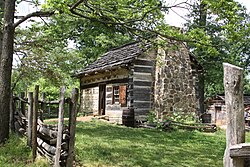
|
Indiana 38°06′47″N 86°59′46″W / 38.113°N 86.996°W |
February 19, 1962 | 199.65 acres (0.8080 km2) | Abraham Lincoln moved with his family from Kentucky to forested Southern Indiana in 1816 and lived there from age 7 to 21. He worked on his family's farm and taught himself with little formal schooling during these formative years. His mother died and is buried here. A living museum reenacts a period farm at a reconstructed homestead near the original home's foundation and a sculpted limestone memorial building.[29] |
| Lincoln Memorial | 
|
District of Columbia 38°53′20″N 77°03′00″W / 38.889°N 77.050°W |
May 30, 1922 | 7.29 acres (0.0295 km2) | Abraham Lincoln led the Union during the Civil War, bringing back together a divided nation and abolishing slavery before being assassinated shortly after the end of the war. A 30 ft (9.1 m)-tall statue of a seated Lincoln sits in this grand temple overlooking the National Mall toward the Capitol. Inside walls are inscribed with the text of his second inaugural address and the Gettysburg Address. Thirty-six Doric columns that represent the states of the Union in 1865 support an entablature whose frieze is inscribed with the names of the 48 states at the time of construction in 1922.[30] |
| Lyndon Baines Johnson Memorial Grove on the Potomac | 
|
District of Columbia 38°52′37″N 77°03′00″W / 38.877°N 77.050°W |
September 27, 1974 | 17.00 acres (0.0688 km2) | Lyndon B. Johnson's presidency saw passage of Great Society legislation that expanded health care access through Medicare and Medicaid, established civil and voting rights prohibiting racial discrimination, addressed poverty and rural development, and promoted conservation and environmental protection. The grove of pine and dogwood trees surrounded by flowers sits on an island in the Potomac with trails, meadows, and a commemorative granite monolith.[31] |
| Martin Luther King Jr. Memorial | 
|
District of Columbia 38°53′10″N 77°02′38″W / 38.886°N 77.044°W |
August 28, 2011 | 2.74 acres (0.0111 km2) | Martin Luther King Jr. was the most significant leader of the Civil rights movement, organizing boycotts against segregated buses, solidarity marches for civil rights, and the March on Washington against inequality. He won the Nobel Peace Prize for nonviolent resistance but was assassinated in 1968. Notable quotations, including from his "I Have a Dream" speech and sermons, are etched on granite walls and a 30 ft (9.1 m) sculpture of King.[32] |
| Mount Rushmore | 
|
South Dakota 43°52′44″N 103°27′32″W / 43.879°N 103.459°W |
July 1, 1939 | 1,278.45 acres (5.1737 km2) | Gutzon Borglum led the sculpting of Presidents George Washington, Thomas Jefferson, Theodore Roosevelt, and Abraham Lincoln into a mountain in the Black Hills. Limited funding resulted in carving only 60 ft (18 m) heads without their torsos. Mountain goats, mule deer, and yellow-bellied marmots are among the wildlife living in the hills near the visitor center and walking path.[33] |
| Pearl Harbor | 
|
Hawaii 21°22′N 157°57′W / 21.36°N 157.95°W |
March 12, 2019 | 21.30 acres (0.0862 km2) | The attack on Pearl Harbor on December 7, 1941, led to the entry of the United States into World War II. Japanese bombers in a surprise attack damaged 21 ships, killing 2,403 Americans. Only the USS Arizona, Oklahoma, and Utah were total losses, and their memorials are the centerpieces of this site that also includes Battleship Row and a visitor center with boat rides to the USS Arizona Memorial at the site of the wreck.[34][35] |
| Perry's Victory and International Peace Memorial | 
|
Ohio 41°39′14″N 82°48′40″W / 41.654°N 82.811°W |
October 26, 1972 | 25.38 acres (0.1027 km2) | Commodore Oliver Hazard Perry's naval fleet defeated the British at the Battle of Lake Erie during the War of 1812, securing control of the lake and later peace with Britain and Canada. The world's largest Doric column, with an observation deck on top, stands 352 ft (107 m) tall on South Bass Island to commemorate the battle and international cooperation.[36] |
| Port Chicago Naval Magazine | 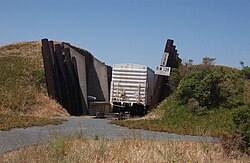
|
California 38°03′22″N 122°01′48″W / 38.056°N 122.030°W |
October 28, 1992 | 5.00 acres (0.0202 km2) | In 1944, 430 tons of munition exploded while being loaded onto ships at the Port Chicago Naval Magazine, creating a three-mile-wide fireball that killed 320 people and seriously injured 390 more in the Port Chicago disaster. The majority of victims were Black, and a subsequent mutiny protesting unsafe conditions and segregation led to a court-martial of the mutineers and eventually integration of the armed forces.[37] |
| Roger Williams | 
|
Rhode Island 41°49′52″N 71°24′40″W / 41.831°N 71.411°W |
October 22, 1965 | 4.56 acres (0.0185 km2) | Roger Williams founded the colony of Rhode Island on the basis of religious freedom, having been exiled from the Massachusetts Bay Colony for separating from the Church of England. The memorial is a landscaped park in downtown Providence, with a visitor center in a historic home.[38] |
| Thaddeus Kosciuszko | 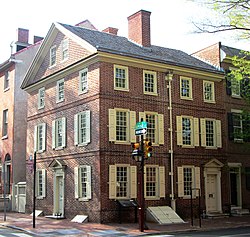
|
Pennsylvania 39°56′35″N 75°08′49″W / 39.943°N 75.147°W |
October 21, 1972 | 0.02 acres (0.0081 hectares) | Polish engineer Tadeusz Kościuszko joined the Continental Army when the American Revolution broke out, overseeing various fort construction projects and later leading troops on the battlefield. After returning to Poland and leading a failed uprising against Russian occupation, he briefly lived at this house in Philadelphia before returning to Europe again. This is the smallest unit of the National Park System.[39] |
| Theodore Roosevelt Island | 
|
District of Columbia 38°53′49″N 77°03′50″W / 38.897°N 77.064°W |
October 27, 1967 | 88.50 acres (0.3581 km2) | Theodore Roosevelt led the Rough Riders during the Spanish–American War and served as governor of New York before becoming vice president and then president when William McKinley was assassinated. His Square Deal promoted trustbusting, labor rights, and consumer protection, and he was a noted conservationist, establishing the Forest Service, the first national monuments, and wildlife refuges. This forested island in the Potomac features hiking trails and a memorial plaza with fountains, notable quotations, and a 17 ft (5.2 m) statue of Roosevelt.[40] |
| Thomas Jefferson Memorial | 
|
District of Columbia 38°52′52″N 77°02′13″W / 38.881°N 77.037°W |
April 13, 1943 | 18.36 acres (0.0743 km2) | Thomas Jefferson was a Founding Father who wrote the Declaration of Independence, was the first secretary of state, and served as president from 1801 to 1809. He promoted democratic ideals, individual freedoms, and states' rights in his nationally formative writings, and as president he expanded the country's territory with the Louisiana Purchase. The memorial, based on the Pantheon and the Rotunda at the University of Virginia that Jefferson designed himself, sits on the Tidal Basin with a bronze statue facing toward the White House surrounded by notable quotations.[41] |
| Vietnam Veterans Memorial | 
|
District of Columbia 38°53′28″N 77°02′53″W / 38.891°N 77.048°W |
November 13, 1982 | 2.18 acres (0.0088 km2) | Almost three million Americans were deployed to Vietnam during the Vietnam War from 1955 to 1975 as part of a campaign to stop communism in the region. Reflective black granite walls, sunken below ground level, bear the names of 58,320 servicemembers who died during the conflict. There are also statues representing women who served and the diversity of soldiers.[42] |
| Washington Monument | 
|
District of Columbia 38°53′20″N 77°02′06″W / 38.889°N 77.035°W |
February 21, 1885 | 106.01 acres (0.4290 km2) | As commanding general of the Continental Army, George Washington was instrumental in securing victory in the Revolutionary War, leading him to serve as the first president of the United States. His presidency laid the foundations for the politics of the republic with policies on banking, taxes, the judiciary, and foreign affairs. The Monument, the centerpiece of the National Mall, is a 555 ft (169 m) tall obelisk of marble, granite, and gneiss topped with a small aluminum pyramid. A variety of interior memorial stones are visible from the elevator to the observation deck.[43] |
| World War I Memorial | 
|
District of Columbia 38°53′46″N 77°01′59″W / 38.896°N 77.033°W |
December 19, 2014 | 1.76 acres (0.0071 km2) | The US entered World War I in 1917 and the American Expeditionary Forces saw about 2.8 million servicemembers fight in Europe through the end of the following year, with 53,000 deaths. Originally called Pershing Park in honor of General John J. Pershing, as of 2019[update] the memorial is undergoing a conversion from a fountain and pond to a lawn and plaza with a wall of remembrance.[44][45] |
| World War II Memorial | 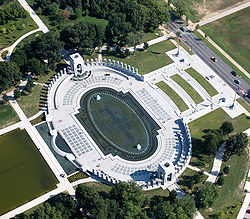
|
District of Columbia 38°53′20″N 77°02′24″W / 38.889°N 77.040°W |
May 29, 2004 | 8.25 acres (0.0334 km2) | Over 16 million veterans served during World War II from 1941 to 1945 alongside the other Allies against the Axis powers. The memorial recognizes their service with two triumphal arches representing the Atlantic and Pacific theaters, surrounded by 56 pillars for the states and territories. At the center is a pool with an oval of fountains, on the east are walls engraved with scenes of war, and on the west is a wall with 4,048 gold stars representing the approximately 404,800 killed in action.[46] |
| Wright Brothers | 
|
North Carolina 36°00′50″N 75°40′05″W / 36.014°N 75.668°W |
December 4, 1953 | 428.44 acres (1.7338 km2) | Wilbur and Orville Wright made the first powered flight with the Wright Flyer at Kill Devil Hills near Kitty Hawk in 1903, developing it into the first fixed-wing aircraft, the Wright Flyer III. A monument tower representing a wing commemorates their achievement and earlier aviation experimenters. Paths outline the routes of the first flights near a reproduction hangar.[47] |
Affiliated areas of the National Park Service
[edit]The National Park Service provides technical or financial assistance to affiliated areas but does not own or administer them.[12]
| Name | Image | Location | Date established[12] | Area[12] | Description |
|---|---|---|---|---|---|
| American Memorial Park | 
|
Northern Mariana Islands 15°12′58″N 145°43′19″E / 15.216°N 145.722°E |
August 18, 1978 | 133.00 acres (0.5 km2) | The Japanese had mandate over the Northern Mariana Islands after World War I and used them as a base for their World War II Pacific offensive. The key summer 1944 Battles of Saipan and Tinian during the Mariana Islands campaign led to the US liberation of the islands. The Commonwealth-owned memorial commemorates the thousands of American and Chamorro casualties during the campaign with a flag monument, bell tower, and granite memorial near recreational park areas and a mangrove forest.[48] |
| Benjamin Franklin | 
|
Pennsylvania 39°57′29″N 75°10′23″W / 39.958°N 75.173°W |
October 25, 1972 | 0.154 acres (0.1 hectares) | Benjamin Franklin was a Founding Father who served in several political and diplomatic roles during the early republic, signing both the Declaration of Independence and the Constitution. He made a number of scientific inquiries and inventions including the lightning rod, bifocals, and the Franklin stove. The 20 ft (6.1 m) marble statue of a seated Franklin by James Earle Fraser sits in the Memorial Hall rotunda of the Franklin Institute in Philadelphia.[49][50] |
| Father Marquette | 
|
Michigan 45°51′11″N 84°43′34″W / 45.853°N 84.726°W |
December 20, 1975 | 52.00 acres (0.2 km2) | The French Jesuit missionary Jacques Marquette founded the first two European settlements in Michigan, Sault Ste. Marie and St. Ignace, seeking to convert Native Americans to Catholicism. He joined Louis Jolliet on an exploration of the Upper Mississippi River. A memorial and interpretive trail in Straits State Park overlook the Mackinac Bridge.[51][52] |
| Oklahoma City | 
|
Oklahoma 35°28′23″N 97°31′01″W / 35.473°N 97.517°W |
April 19, 2000 | 6.24 acres (0.0 km2) | Anti-government terrorists detonated a truck bomb that destroyed the Alfred P. Murrah Federal Building, killing 168 people, injuring another 680, and damaging hundreds of buildings. The memorial features a reflecting pool flanked by square bronze gates that represent the moments before and after the event at 9:01 am on April 19, 1995. A field of empty chairs and what is left of the building's walls symbolize the victims and survivors, mostly federal employees and children at a day care.[53][54] |
| Red Hill Patrick Henry | 
|
Virginia 37°01′55″N 78°53′53″W / 37.032°N 78.898°W |
May 12, 1986 | 1,000 acres (4.0 km2) | Patrick Henry was the first governor of Virginia and was known for his oration for the cause of independence from Britain, including his 1775 "Give me liberty or give me death!" speech. He lived at his Red Hill estate the last five years of his life, which now has the original law office and reconstructed home.[55] |
Other national memorials
[edit]Congress has designated a number of sites as national memorials but not as units or affiliated areas of the National Park Service. While some are maintained by other federal agencies, most of these were created by local governments or private organizations which sought federal designation for wider and official recognition; the naming typically does not come with federal funding, but Congress has provided funds or allowed private fundraising for certain memorial sites.[5] The Department of the Interior has noted that Congressional designation of private or local government sites as "National" may mislead the public into believing they are affiliated with the federal government.[56] Congress has also authorized the construction of many memorials or commemorative works on federal land under the Commemorative Works Act, usually in Washington, D.C., or nearby;[57] these are not listed unless specifically called a national memorial.
| Name | Image | Location | Date designated[58] | Description |
|---|---|---|---|---|
| AIDS Memorial Grove | 
|
California | November 12, 1996 | This seven-acre (0.028 km2) landscaped space in San Francisco's Golden Gate Park features redwood trees, meadows, and memorial spaces dedicated to victims and patients of HIV/AIDS and the continued fight against the disease.[59][60][61] |
| Astronauts Memorial | 
|
Florida | May 8, 1991 | The Space Mirror Memorial at NASA's Kennedy Space Center is a reflective black granite monument engraved with the names of 24 astronauts who have died in spaceflight missions or training. Major disasters include Apollo 1 and Space Shuttles Challenger and Columbia.[62][63] |
| Battle of Midway | 
|
Midway Atoll | September 13, 2000 | The Battle of Midway in June 1942 was the turning point of the Pacific War that put the US Navy on the offensive. The victory cost the lives of 307 sailors, a destroyer, and an aircraft carrier, but secured the vital base on the island and weakened the Japanese position. The Fish and Wildlife Service maintains a memorial park at the dual-named Midway Atoll National Wildlife Refuge and Battle of Midway National Memorial, a breeding ground for albatross, Hawaiian monk seals, and other marine life.[64] |
| David Berger Memorial | 
|
Ohio | March 5, 1980 | David Berger was an American Israeli weightlifter who competed at the 1972 Summer Olympics. He and ten other Israeli competitors and coaches were kidnapped and killed by terrorists in the Munich massacre. Located at a Jewish Community Center, a steel sculpture of the five Olympic rings split in half sits on eleven supporting segments.[65][66] |
| El Paso Community Healing Garden | – | Texas | December 29, 2022 | A right-wing terrorist targeted Latino Americans at a Walmart store in El Paso, killing 23 people and injuring 22 in a mass shooting. A memorial to these victims of white supremacy and gun violence consisting of 23 bronze plaques on a semicircular wall was installed at Ascarate Park in the Mission Valley neighborhood in August 2021.[67] |
| National D-Day Memorial | 
|
Virginia | June 6, 2001 | American troops joined Allied forces in the Invasion of Normandy on D-Day, June 6, 1944, to begin the liberation of France. More than 150,000 Allied troops landed in a sustained airborne and amphibious assault on five beaches that saw more than 10,000 casualties. The memorial includes a central pool, Operation Overlord arch, numerous statues of commandos in action and General Eisenhower, and flags of participating nations.[68] |
| Disabled American Veterans Vietnam Veterans | 
|
New Mexico | November 13, 1987 | The parents of a soldier killed in Vietnam built a sail-shaped chapel with the assistance of Disabled American Veterans to honor all veterans of the war. The site, a New Mexico Department of Veteran Services memorial, also has a helicopter damaged in Vietnam and sculptures of a soldier and nurses.[69][70] |
| Distinguished Flying Cross | – | California | July 25, 2014 | The Distinguished Flying Cross has been awarded to more than 170,000 members of the US armed forces and some civilians who have shown "heroism or extraordinary achievement while participating in an aerial flight". The March Field Air Museum hosts this pyramidal monument in honor of their service.[71] |
| National Memorial to Fallen Educators | 
|
Kansas | April 30, 2018 | Located at the National Teachers Hall of Fame, this monument honors educators who died in the course of their roles, including victims of school shootings and school bus crashes.[72] |
| National Fallen Firefighters Memorial | 
|
Maryland | August 9, 1990 | On the campus of the National Fire Academy, a sculpted St. Florian cross and eternal flame are surrounded by a Wall of Honor with the names of firefighters who died in the line of duty. It is maintained by the National Fallen Firefighters Foundation.[73] |
| Japanese American Memorial to Patriotism During World War II | 
|
District of Columbia | November 9, 2000 | The US government baselessly challenged the loyalty of 120,000 Japanese Americans during World War II, unconstitutionally detaining them in a number of concentration camps around the country. Despite that, 33,000 Japanese Americans served their country in the armed forces. This monument depicting cranes escaping barbed wire symbolizes their sacrifices during this injustice. It is part of the National Mall and Memorial Parks NPS unit.[74][75] |
| Kol Israel Foundation Holocaust Memorial | 
|
Ohio | December 29, 2022 | The Zion Memorial Park Cemetery donated land for the construction of a monument to victims of the Holocaust in 1961, the first in the United States. A ring of granite is engraved with names of 1,300 family members of Cleveland-area Holocaust survivors. It surrounds a central column that contains ashes of victims.[76][77][78][79] |
| National Law Enforcement Officers Memorial | 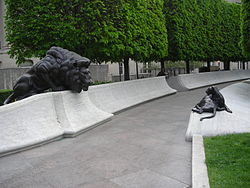
|
District of Columbia | October 15, 1991 | Honoring more than 23,000 law enforcement officers who have died in the line of duty, the memorial plaza has tree-lined pathways protected by twelve bronze lions.[80] |
| Medicine Creek Treaty | 
|
Washington | December 18, 2015 | The 1854 Treaty of Medicine Creek established three reservations for nine south Puget Sound-area tribes, who ceded 2,240,000 acres (9,100 km2) to the US government; agreed-upon payments and hunting and fishing rights however were not respected, leading to further conflict. The signing site is managed by the Fish and Wildlife Service in the Billy Frank Jr. Nisqually National Wildlife Refuge, named for a Nisqually activist who successfully fought for the treaty rights.[81] |
| Mt. Soledad Veterans Memorial | 
|
California | December 8, 2004 | A wooden cross was originally placed on Mount Soledad in San Diego by local residents in 1913. The current 29 ft (8.8 m)-tall concrete cross was built in 1954 by Christian groups and was designated a memorial to veterans in 1989. The Department of Defense took the site from the city by eminent domain in 2006 until it was sold to a private association in 2015 following a three-decade-long Establishment Clause legal battle. Six walls are covered in plaques commemorating veterans and military units.[82][83] |
| National Native American Veterans Memorial | 
|
District of Columbia 38°53′20″N 77°00′58″W / 38.889°N 77.016°W |
November 11, 2020 | This memorial at the National Museum of the American Indian honors the military service of American Indian, Alaska Native, and Native Hawaiian veterans. A vertical steel circle stands on a stone drum from which water flows and a ceremonial fire burns.[84] |
| National Pulse Memorial | 
|
Florida 28°31′12″N 81°22′37″W / 28.520°N 81.377°W |
June 25, 2021 | Pulse, a gay nightclub in Orlando, Florida, was the scene of a mass shooting that killed 49 people on June 12, 2016. There are plans for a permanent memorial with a reflecting pool at the site.[85][86] |
| National Veterans Memorial and Museum | 
|
Ohio | October 27, 2018 | This is the first museum dedicated to veterans and their families, focusing on their individual stories and sacrifices rather than the military and war. Exhibits show servicemembers' journeys throughout American history and how veterans are recognized in society. An elm-lined memorial grove with waterfalls into a reflecting pool offers space for remembrance.[87] |
| Prisoner of War/Missing in Action | 
|
California | December 10, 2004 | This memorial at Riverside National Cemetery (US Department of Veterans Affairs) depicts a man on his knees and bound by his captors, surrounded by pillars of black marble. It commemorates American servicemembers who have been taken prisoner of war or went missing in action.[88] |
| United States Marine Corps War Memorial | 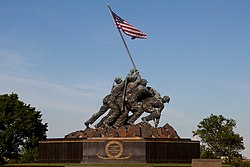
|
Virginia | November 10, 1954 | This memorial is dedicated to the dead of the US Marine Corps since its founding in 1775. Located at George Washington Memorial Parkway it depicts the raising of the flag on Iwo Jima, a symbol of the Corps's dedication in amphibious warfare.[89][90] |
| USS Indianapolis Memorial | 
|
Indiana | November 30, 1993 | The heavy cruiser USS Indianapolis was torpedoed by a submarine after it delivered parts of the Little Boy atomic bomb to Tinian, killing 300 sailors when it sank. Another 600 perished during four days adrift and only 316 survived, making it the US Navy's greatest loss of life at sea due to its failure to monitor the ship's movement. The granite memorial resembles the shape of a ship and depicts the Indianapolis with the names of the crew.[91] |
| White Cross World War I Memorial | 
|
California | January 10, 2002 | A white cross was originally erected by Veterans of Foreign Wars (VFW) in the Mojave Desert in 1934 as a memorial to American participation in World War I and those who served. Previously in Mojave National Preserve, the land around the cross was conveyed to the VFW due to separation of church and state concerns, the constitutionality of which transfer was upheld by the Supreme Court in 2010.[92] |
Future national memorials
[edit]These memorials have been authorized by Congress but have not yet been constructed and established. Three would become NPS units if completed.[93]
| Name | Location | Date authorized | Description |
|---|---|---|---|
| Adams Memorial | District of Columbia | November 5, 2001 | Will honor presidents John Adams and John Quincy Adams, their wives Abigail Adams and Louisa Adams, and other members of the Adams political family. Neither a location nor design has been selected but a new planning commission was authorized in 2019. It will expire in 2025.[94] |
| Hershel Woody Williams National Medal of Honor Monument | District of Columbia | December 27, 2021 | Will honor recipients of the Medal of Honor. Named after Hershel W. Williams. There is a 2028 deadline to raise funds and finalize a design for the memorial.[95] |
| National Emergency Medical Services Memorial | District of Columbia | November 3, 2018 | Will honor the services of emergency medical services personnel. There is a 2025 deadline to raise funds and finalize a design for the memorial.[96] |
| National Desert Storm and Desert Shield Memorial | District of Columbia 38°53′28″N 77°03′04″W / 38.891°N 77.051°W |
December 19, 2014 | Will commemorate the events and veterans of the Gulf War, a six-month troop buildup and conflict that ended the Iraqi invasion of Kuwait. A spiral-shaped wall design is proposed.[97] |
| National Global War on Terrorism Memorial | District of Columbia | August 18, 2017 | Will commemorate the events and veterans of the War on Terror, including the Iraq War and War in Afghanistan and other military campaigns. There is a 2028 deadline to raise funds and finalize a design for the memorial, which received an exemption to be built in the Reserve.[98] |
| Women's Suffrage National Monument | District of Columbia | December 17, 2020 | Will honor suffragists who organized and demonstrated for the women's right to vote in the United States. There is a 2027 deadline to raise funds and finalize a design for the memorial.[99] |
See also
[edit]- List of areas in the United States National Park System
- List of national monuments of the United States
- Presidential memorials in the United States
- National Capital Memorial Advisory Commission
References
[edit]- ^ "Designations of National Park System Units". National Park Service. Retrieved May 4, 2019.
- ^ "National Park System" (PDF). National Park Service. January 13, 2017. Archived from the original (PDF) on January 28, 2017.
- ^ "What's In a Name? Discover National Park System Designations". National Park Service. Retrieved March 27, 2019.
- ^ Mackintosh, Barry (2005). The National Parks: Shaping the System. U.S. Department of the Interior. pp. 32–33. ISBN 978-0-912627-73-1.
- ^ a b "Memorials and Commemorative Works Outside Washington, DC: Background, Federal Role, and Options for Congress" (PDF). Congressional Research Service. May 29, 2019. Retrieved March 22, 2021.
- ^ Montgomery, David (July 31, 2018). "A wave of war memorials is coming to D.C. Are we all at peace with that?". Washington Post. Retrieved April 16, 2019.
- ^ Doss, Erika (September 7, 2012). Memorial Mania: Public Feeling in America. University of Chicago Press. ISBN 978-0-226-15939-3.
- ^ National Historic Preservation Act of 1966, Public Law 102–575, National Register of Historic Places. Retrieved May 13, 2019
- ^ "54 U.S. Code § 309101 – Sites and structures that commemorate former Presidents". LII / Legal Information Institute. Retrieved April 16, 2019.
- ^ "National Park System" (PDF). National Park Service. January 13, 2017. Archived from the original (PDF) on January 28, 2017.
- ^ "16 U.S. Code § 437 – Fort McHenry; restoration and preservation". LII / Legal Information Institute. Retrieved April 16, 2019.
- ^ a b c d e The National Parks: Index 2012–2016 (PDF). Washington, D.C.: National Park Service. Archived from the original (PDF) on November 13, 2018. Retrieved November 19, 2018.
- ^ "National Reports". National Park Service. Retrieved April 8, 2014.
- ^ "Arkansas Post National Memorial". National Park Service. Retrieved March 31, 2019.
- ^ "Arlington House, The Robert E. Lee Memorial". National Park Service. Retrieved March 31, 2019.
- ^ "Chamizal National Memorial". National Park Service. Retrieved March 31, 2019.
- ^ "Coronado National Memorial". National Park Service. Retrieved March 31, 2019.
- ^ "De Soto National Memorial". National Park Service. Retrieved March 31, 2019.
- ^ "Dwight D. Eisenhower Memorial". National Park Service. Retrieved January 25, 2021.
- ^ "Dwight D. Eisenhower Memorial". Eisenhower Memorial Commission. Retrieved September 17, 2020.
- ^ "Federal Hall National Memorial". National Park Service. Retrieved March 31, 2019.
- ^ "Flight 93 National Memorial". National Park Service. Retrieved March 31, 2019.
- ^ "Fort Caroline National Memorial". National Park Service. Retrieved March 3, 2019.
- ^ "Franklin Delano Roosevelt Memorial". National Park Service. Retrieved March 31, 2019.
- ^ "General Grant National Memorial". National Park Service. Retrieved March 31, 2019.
- ^ "Hamilton Grange National Memorial". National Park Service. Retrieved March 31, 2019.
- ^ "Johnstown Flood National Memorial". National Park Service. Retrieved March 31, 2019.
- ^ "Korean War Veterans Memorial". National Park Service. Retrieved March 31, 2019.
- ^ "Lincoln Boyhood National Memorial". National Park Service. Retrieved March 31, 2019.
- ^ "Lincoln Memorial". National Park Service. Retrieved March 31, 2019.
- ^ "Lyndon Baines Johnson Memorial Grove on the Potomac". National Park Service. Retrieved March 31, 2019.
- ^ "Martin Luther King, Jr. Memorial". National Park Service. Retrieved August 31, 2011.
- ^ "Mount Rushmore National Memorial". National Park Service. Retrieved March 31, 2019.
- ^ "Pearl Harbor National Memorial". National Park Service. Retrieved May 4, 2019.
- ^ "Text – S.47 – John D. Dingell, Jr. Conservation, Management, and Recreation Act". United States Congress. March 12, 2019. Retrieved March 12, 2019.
- ^ "Perry's Victory and International Peace Memorial". National Park Service. Retrieved March 31, 2019.
- ^ "Port Chicago Naval Magazine National Memorial". National Park Service. Retrieved March 31, 2019.
- ^ "Roger Williams National Memorial". National Park Service. Retrieved March 31, 2019.
- ^ "Thaddeus Kosciuszko National Memorial". National Park Service. Retrieved March 31, 2019.
- ^ "Theodore Roosevelt Island". National Park Service. Retrieved March 31, 2019.
- ^ "Thomas Jefferson Memorial". National Park Service. Retrieved March 31, 2019.
- ^ "Vietnam Veterans Memorial". National Park Service. Retrieved March 31, 2019.
- ^ "Washington Monument". National Park Service. Retrieved March 31, 2019.
- ^ "National Mall and Memorial Parks – National World War I Memorial". National Park Service. Retrieved March 31, 2019.
- ^ McGlone, Peggy (January 26, 2016). "World War I Centennial Commission picks final design for memorial". Washington Post.
- ^ "World War II Memorial". National Park Service. Retrieved March 31, 2019.
- ^ "Wright Brothers National Memorial". National Park Service. Retrieved March 31, 2019.
- ^ "American Memorial Park". National Park Service. Retrieved March 31, 2019.
- ^ "Independence National Historical Park – Benjamin Franklin National Memorial". National Park Service. Retrieved March 31, 2019.
- ^ "Benjamin Franklin Memorial". The Franklin Institute. February 19, 2014. Retrieved March 31, 2019.
- ^ "Father Marquette National Memorial". National Park Service. Retrieved March 31, 2019.
- ^ "Father Marquette National Memorial". Michigan History Center. Retrieved March 31, 2019.
- ^ "Oklahoma City National Memorial". National Park Service. Retrieved March 31, 2019.
- ^ "The Oklahoma City National Memorial & Museum". Oklahoma City National Memorial & Museum. Retrieved March 31, 2019.
- ^ "Red Hill Patrick Henry National Memorial". Patrick Henry Memorial Foundation. Retrieved March 31, 2019.
- ^ "S. 4377/H.R. 4380". Department of the Interior. October 5, 2022. Retrieved January 6, 2023.
- ^ "[USC02] 40 USC 8903: Congressional authorization of commemorative works". US House of Representatives. Retrieved April 6, 2019.
- ^ "[USC04] 54 USC Ch. 3203: MONUMENTS, RUINS, SITES, AND OBJECTS OF ANTIQUITY". US House of Representatives. Retrieved March 26, 2019.
- ^ "Welcome to National AIDS Memorial". National AIDS Memorial Grove. Retrieved April 6, 2019.
- ^ "AIDS Memorial Grove". Golden Gate Park. February 23, 2011. Retrieved April 6, 2019.
- ^ "LGBTQ Memorials: National AIDS Memorial Grove, San Francisco, CA (U.S. National Park Service)". National Park Service. Retrieved April 6, 2019.
- ^ "The Space Mirror Memorial". The Astronauts Memorial Foundation. Retrieved April 7, 2019.
- ^ "Space Mirror Memorial". Kennedy Space Center Visitor Complex. Retrieved April 7, 2019.
- ^ "Battle of Midway National Memorial". U.S. Fish and Wildlife Service. Retrieved March 26, 2019.
- ^ "David Berger National Memorial". National Park Service. February 10, 2016. Retrieved April 7, 2019.
- ^ "David Berger Memorial". Mandel JCC. Retrieved April 8, 2019.
- ^ "House approves National Memorial status for El Paso Community Healing Garden". KTSM 9 News. March 16, 2022. Retrieved December 28, 2022.
- ^ "National D-Day Memorial". National D-Day Memorial. Retrieved April 9, 2019.
- ^ "Vietnam Veterans Memorial". David Westphall Veterans Foundation. Retrieved April 8, 2019.
- ^ "Angel Fire Memorial". NM Department of Veterans Services. Retrieved April 15, 2021.
- ^ "The Distinguished Flying Cross National Memorial". March Field Air Museum. Retrieved March 26, 2019.
- ^ "National Memorial to Fallen Educators". National Memorial to Fallen Educators. Retrieved April 12, 2019.
- ^ "The National Fallen Firefighters Memorial". National Fallen Firefighters Foundation. Retrieved April 12, 2019.
- ^ "Japanese Americans At War – World War II Memorial". National Park Service. Retrieved April 6, 2019.
- ^ "Japanese American Memorial to Patriotism During World War II". National Park Service. Retrieved April 12, 2019.
- ^ "Memorial". Kol Israel Foundation. Retrieved December 28, 2022.
- ^ "Cleveland's Holocaust Memorial". Cleveland Jewish History. Retrieved December 28, 2022.
- ^ "Cleveland's Kol Israel Holocaust Memorial becomes United States' first Holocaust memorial to be given national status". wkyc.com. December 28, 2022. Retrieved December 28, 2022.
- ^ Jiménez, Jesus (December 30, 2022). "61-Year-Old Holocaust Monument Designated a National Memorial". The New York Times. ISSN 0362-4331. Retrieved January 1, 2023.
- ^ "National Law Enforcement Officers Memorial". National Law Enforcement Officers Memorial Fund. Retrieved April 12, 2019.
- ^ "Billy Frank Jr., Tell Your Story". U.S. Fish and Wildlife Service. Retrieved March 26, 2019.
- ^ "Mt. Soledad National Veterans Memorial". Mt. Soledad Memorial Association. Retrieved April 15, 2019.
- ^ "Jewish War Veterans v. City of San Diego" (PDF). United States Court of Appeals for the Ninth Circuit. January 4, 2011. Archived from the original (PDF) on January 12, 2011. Retrieved April 14, 2019.
- ^ "National Native American Veterans Memorial". National Museum of the American Indian. Retrieved November 11, 2020.
- ^ "Congress backs national memorial designation for former Pulse nightclub site". The New York Times. Retrieved June 19, 2021.
- ^ "Memorial". Pulse Orlando. Retrieved January 31, 2025.
- ^ "National Veterans Memorial and Museum". Retrieved April 13, 2019.
- ^ "Riverside National Cemetery – National Cemetery Administration". US Department of Veterans Affairs. Retrieved April 14, 2019.
- ^ "US Marine Corps War Memorial – George Washington Memorial Parkway". National Park Service. Retrieved April 12, 2019.
- ^ "U.S. Marine Corps War Memorial". National Park Service. Archived from the original on April 12, 2019. Retrieved April 12, 2019.
- ^ "USS Indianapolis CA35 Memorial". Indiana War Memorials Foundation. Retrieved April 12, 2019.
- ^ "White Cross World War I Memorial – Mojave National Preserve". National Park Service. Retrieved April 15, 2019.
- ^ "Recent Changes to the National Park System". National Park Service. Retrieved March 12, 2021.
- ^ Tully-McManus, Katherine (July 23, 2018). "House Backs Plan for John Adams Memorial". Roll Call. Retrieved April 15, 2019.
- ^ "The Monument". National Medal of Honor Museum. Retrieved April 2, 2024.
- ^ "EMS Memorial". Retrieved April 3, 2024.
- ^ "National Desert Storm and Desert Shield War Memorial". National Desert Storm Memorial Association. Retrieved April 15, 2019.
- ^ "Global War on Terrorism Memorial Foundation". Retrieved April 15, 2019.
- ^ "Women's Suffrage National Monument Foundation". Women's Suffrage National Monument Foundation. Retrieved April 2, 2024.
 KSF
KSF